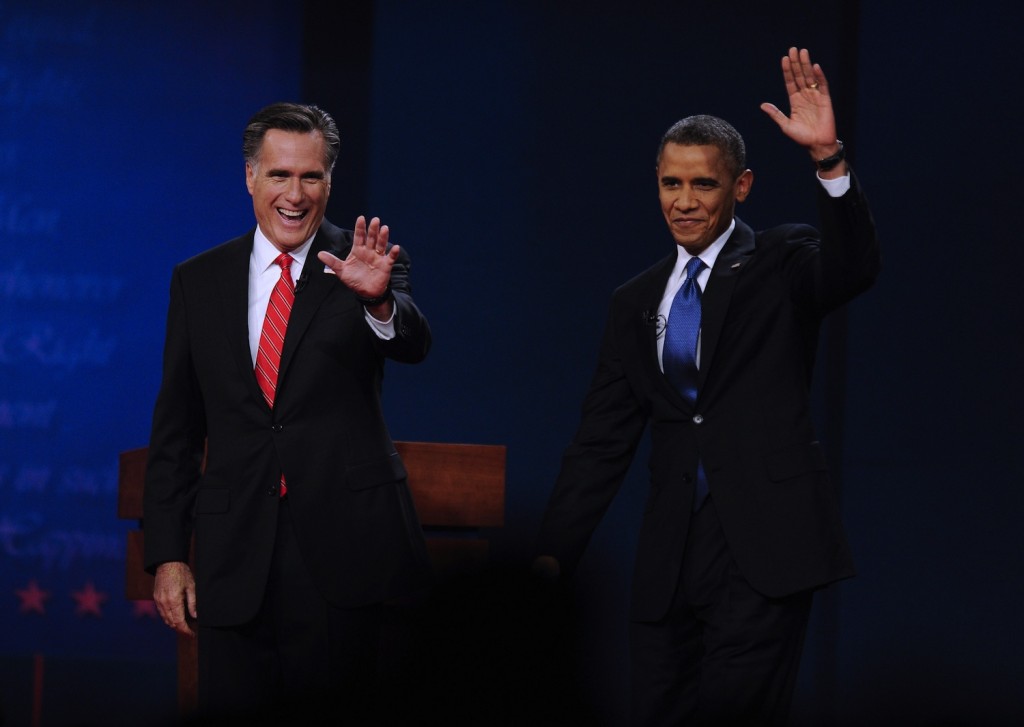Students Give Post Debate Reactions
Zhang Jun
Republican presidential candidate Mitt Romney, left, and U.S. President Barack Obama attend the first presidential debate at Denver University on Wednesday, October 3, 2012, in Denver, Colorado. (Zhang Jun/Xinhua/Zuma Press/MCT)
October 4, 2012

The first of four presidential debates was held at the University of Denver, in Colorado, one of the main swing states in next month’s election. Presidential candidates Barack Obama and Mitt Romney faced off for 90 minutes in a showdown that allowed the candidates to address each other directly and define their platform’s differences.
Each candidate spent ample time in preparation, both employing surrogates of their opponents (Republican Senator Rob Portman stood in as Obama and John Kerry stood in as Romney). Romney prepared “zingers” and focused on attempting to create debate moments. Obama’s strategy was to not focus on sound bites, which the president has had trouble creating in the past, and concentrating instead on building a sound argument.
Fordham College at Lincoln Center (FCLC) students were able to view a live stream of the presidential debate in the South Lounge, courtesy of the Dorothy Day Center for Social Justice, while others watched from their dormitories in McMahon, or at home for commuters.
Marie Kadoyama, FCLC ’16, remarked that Obama’s personal touches humanized him. “The anecdotes [he] was telling made him more relatable as a human being,” she said. “And some of the points Romney made seem blown a little out of proportion. Cutting funding for things like PBS? What?”
Noah Goldstein, FCLC ’16, said, “Obama has done a much better job of explaining how his plan works, not just what it should do. I’d also like a much less economy-focused debate. It’s an important and broad issue, but there a lot of other important issues,” he added citing, “Gay marriage, importance of military spending, immigration, importance of scientific research. That’s just off the top of my head.”
“Romney just said that if he didn’t like his insurance company, he’d get a new one. In many ways, he’s the epitome of white privilege,” Goldstein said.
Also commenting on Mitt Romney’s thoughts on health insurance was Tess Alexander, FCLC ’14. “Yes, Romney, that’s great, assuming you can afford insurance to begin with. His responses show his detachment from the average American.”
Jim Lehrer, the debate’s moderator, found his rules overlooked by both candidates. Both sides disrupted the structure of the debate. When Lehrer tried to restore order, the candidates pushed back. At one point, Lehrer reminded the president that he had five seconds left for his answer, and Obama said he “had five seconds before you interrupted me.” Gisela Iribarren, FCLC ’13, said, “The ‘I’mma let you finish!’ moments are truly embarrassing.”
Iribarren also offered a positive view of Mitt Romney. “I felt like the debate made me at least partially understand Romney’s platform better than I did before. He for the first time, to me, gave the impression that he had a plan and knew what he was talking about, but on economic issues neither of them has a true solution,” Iribarren said. “They didn’t address the multitude of social/human rights issues that I am not willing to compromise on. The debate made me realize how little I know about the economy, in a way that made the issues honestly seem hopeless. But it didn’t at all change my vote.”
Ismahan Sharhan, FCLC ’15, did not feel like the debate appealed to the younger audience. “The college topic was brought up, but not talked about to the extent that I wished it to be,” Sharhan said. “That pretty much explains why so many young people do not vote. There is no appeal.”
The next debate will be between Vice President Joe Biden and Congressman Paul Ryan. It will take place on Oct. 11 at 9 p.m. The topic of the next debate will be foreign and domestic policy.













